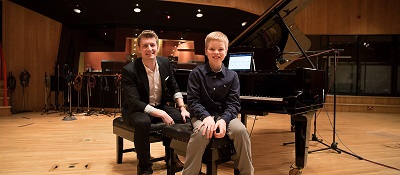
Lead photo: Eleven-year-old composer Garrett Weyenberg, right, and StaffPad creator David William Hearn are pictured in Angel Studios in London on Jan. 29, 2016. Photo by David Palmer.
The songs began when Garrett Weyenberg was 2 and would climb onto a piano bench and make up little tunes, each an ode to things like snowmen or peaches. By ages 5 and 6, he was composing full, intricate songs, sometimes scooting his entire body along the piano to play multiple octaves.
By age 10 last year, Garrett finished an eight-minute piece called “Sonatina in G Major,” a lively work in three movements that won a regional composition contest. It was just one song in a vast oeuvre of original music, built from a lifetime of melodies flowing from Garrett’s head. But until recently, he had no easy way to write his musical thoughts, no practical means of saving his music and sharing it with others to play.
That all changed when Garrett turned 11. He got a Surface Pro 3 for his birthday and started using StaffPad, a notation app that lets users handwrite music and save it for editing, playback and sharing. Designed for Microsoft Surface, the groundbreaking app uses the device’s pen-and-touch technology for a natural, tactile experience, and combines it with modern tools in handwriting recognition, orchestral playback and score editing.
“I like that it’s really simple and intuitive. I can just jot down ideas and it’s easy for me to get a song down now,” said Garrett from his home in McKinney, Texas. He can now write music wherever he is – at a piano or in the car – and his scores are saved in OneDrive for seamless syncing and access across devices.
Garrett recently flew to London to meet the creator of StaffPad, David William Hearn, a composer and music producer known for his work in TV and movies, from “Friday Night Lights” to “Les Misérables.” After Garrett’s mom emailed Hearn about StaffPad, the meeting arose as a way for Garrett to meet the man behind his favorite app, and for the maker to meet a young musician empowered by his creation. The two worked on one of Garrett’s songs in a session filmed for a new video by Microsoft.
“He’s obviously a very talented kid, very musical,” said Hearn, who’s based in London. He’s thrilled that StaffPad, available exclusively in the Windows Store, enables creativity in musicians around the world, from kids like Garrett to retired hobbyists to professional composers.
“It’s amazing how far-reaching music is,” he said. “There’s so many people writing music, so many people creating, which is just such a lovely thing. It goes so far beyond what I thought we could achieve with the app.”
Hearn was inspired to create StaffPad while working on a film score and wishing there was a way to make quick edits with other musicians, instead of having to go back to his studio and fire up his computer. He also wanted to return to the ease of handwriting music and evolve it with technology.
“There’s nothing more natural and fluid than picking up a pen and writing down your musical thoughts,” said Hearn. “It was really an idea of how we could push written music forward.”
StaffPad converts handwritten notes into a beautiful typeset score, with no mouse, keyboard or complicated notation software to fiddle with. The app’s simple interface enables musicians to focus on music and not technology, and Surface tablets deliver a smooth, mobile and productive experience.
“Before StaffPad, I was really just sort of chained to the desk,” said Hearn. “It’s great to have the option to move away from the computer and get outside, or sit down at the piano and just write as you would on paper.”
Recently updated for Windows 10, StaffPad now has a handy “Composer Assistant” that knows voice commands to add woodwinds or change the key signature. And Microsoft’s Universal Windows Platform means StaffPad works on the 84-inch Surface Hub, a great educational tool Hearn is using with the Royal Academy of Music in London on new ways to teach music in a lecture hall.
Before Garrett had StaffPad, his mom used to record hours of video of him playing piano, so that he could later score his music. But notating was so tedious that it rarely happened. It took Garrett a year to write his seven-page “Sonatina in G Major,” a feat he said would now take a week or two with StaffPad and Surface.
“He is composing music in his mind daily,” said Garrett’s mother, Stephanie Weyenberg. “StaffPad truly has been the game changer for him.”
When a medical condition left Garrett in excruciating pain in recent weeks, writing music was an emotional balm, and the technology enabled him to write from bed. It’s helped deepen his love for music as a form of expression and a way to connect with others.
“It’s kind of cool for me that other people could play something that originally I was thinking,” he said.
For Microsoft, StaffPad highlights the power of technology – from natural touch input to Surface Pen precision —to help people young and old express creativity in new ways.
“We’re so inspired by Garrett’s passion and use of StaffPad’s powerful capabilities, the way David envisioned for every professional, educator, student or individual,” said Mona Cao, product marketing manager for Surface.
“It’s digital creation at its best.”
Story by: Vanessa Ho, Microsoft News Center Staff

